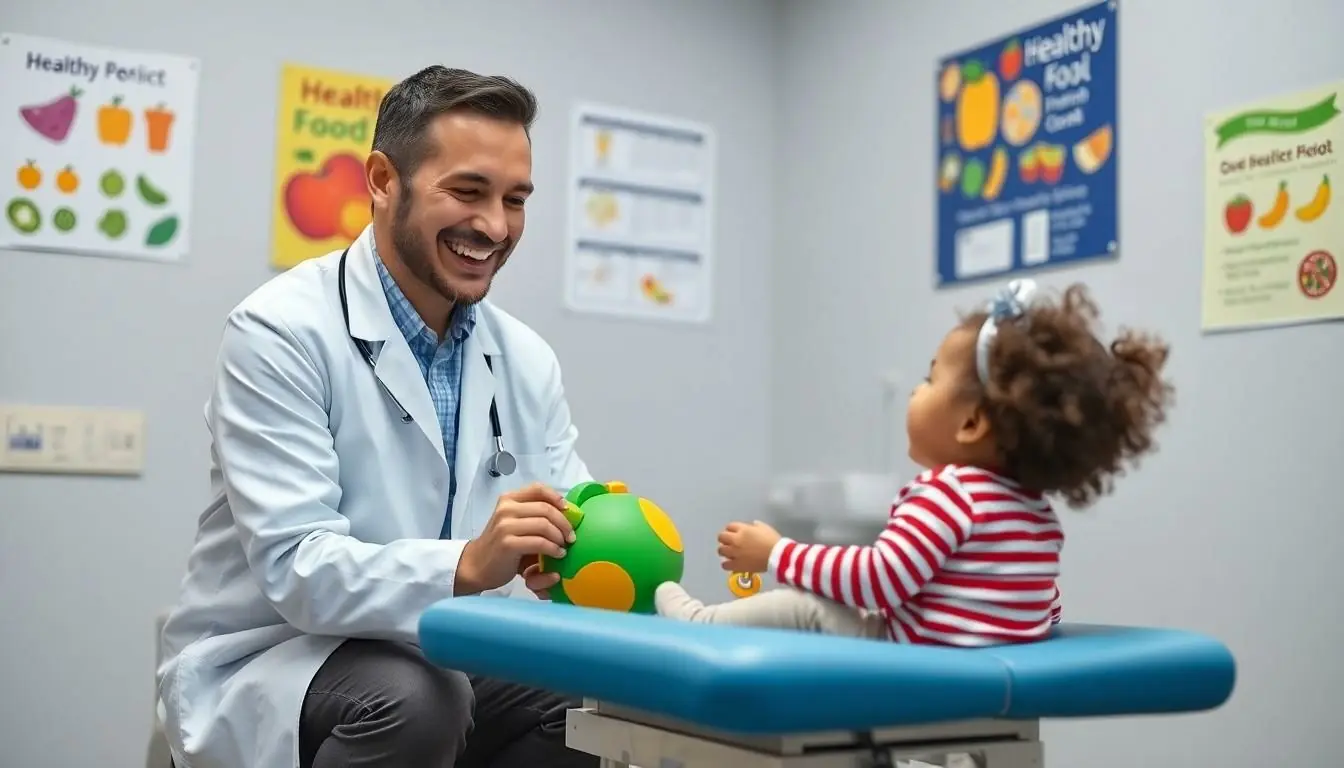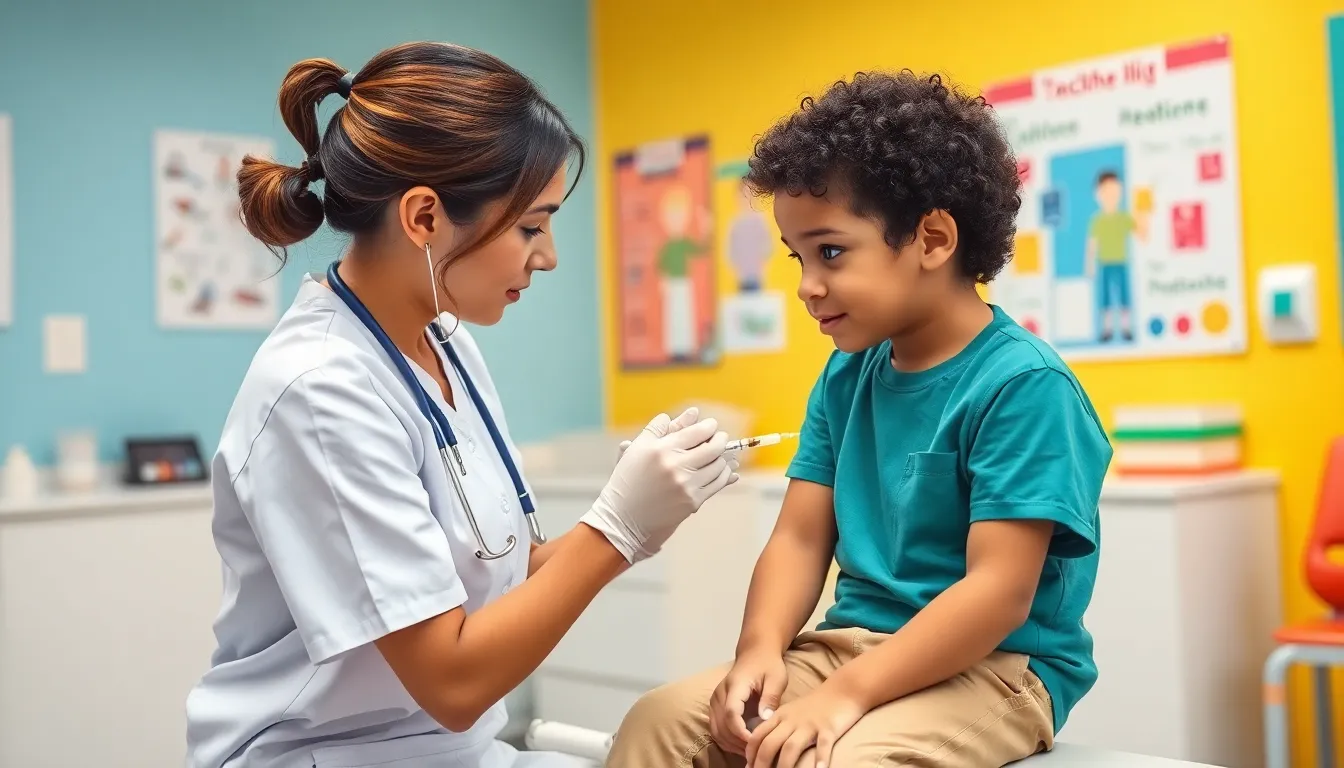When it comes to kids’ health, it’s not just about avoiding broccoli or dodging the flu shot. It’s a vibrant world of giggles, growth, and the occasional tantrum. Parents often find themselves navigating the wild waters of pediatric care, armed with nothing but a thermometer and a well-worn copy of “What to Expect.” But fear not! Helping kids thrive in their early years is easier than it seems.
Table of Contents
ToggleUnderstanding Helping Kids Pediatrics
Helping kids pediatrics encompasses various aspects of healthcare dedicated to children. This area of medicine requires a comprehensive understanding of children’s unique health needs.
Definition and Importance
Helping kids pediatrics focuses on promoting the health and development of children from infancy to adolescence. Pediatricians play vital roles by diagnosing and managing illnesses, monitoring growth, and providing preventive care. This specialization addresses both physical and mental health challenges that children face. The right pediatric care fosters healthy habits, supports emotional well-being, and ensures timely vaccinations. These elements contribute to overall childhood development and long-term wellness.
Key Areas of Focus
Several key areas highlight the importance of helping kids pediatrics. Preventive care ensures vaccinations are up to date and health screenings are conducted regularly. Nutrition education guides parents in providing balanced diets to support healthy growth. Behavioral health addresses emotional and developmental issues while promoting mental health. Chronic conditions management assists children with ongoing health challenges, offering tailored treatment plans. Moreover, family-centered care involves parents in decision-making, strengthening support systems for their children. These areas collectively enhance children’s health outcomes and promote a holistic approach to pediatric care.
Common Pediatric Health Issues
Pediatric health issues affect children’s physical and mental well-being. These challenges often arise at various stages of development.
Nutrition and Growth
Nutrition impacts children’s growth significantly. Nutrient-rich diets promote healthy development, while poor nutrition can lead to obesity or malnutrition. Vitamin D and calcium support bone health, while proteins aid in muscle development. Pediatricians recommend regular check-ups to monitor growth patterns. Adhering to balanced meal plans with fruits, vegetables, and whole grains improves overall health. Educating families on portion sizes helps maintain a healthy weight. Parents should track their child’s dietary habits to encourage healthy choices at a young age.
Developmental Milestones
Developmental milestones guide parents in understanding their child’s growth progress. Key milestones include the ability to crawl, walk, and communicate effectively. Tracking cognitive, social, and emotional development ensures any delays receive prompt attention. Pediatricians assess these milestones during routine visits to identify potential learning and behavioral issues. Early intervention programs can address concerns, promoting positive outcomes. Observing changes in play patterns, speech, or interaction with peers provides vital insight into ongoing development. It’s crucial for parents to engage with their children at each milestone, fostering an encouraging environment.
Mental Health Considerations
Mental health plays a vital role in children’s overall well-being. Anxiety, depression, and behavioral disorders can emerge during childhood. Recognizing signs of mental health issues early promotes timely intervention. Pediatricians often conduct assessments to evaluate emotional and behavioral challenges. Building resilience through healthy coping strategies and social skills is essential. Encouraging open conversations about feelings at home helps children develop emotional intelligence. Supportive environments such as schools and community programs enhance mental health. Parents who seek help when needed set positive examples for their children.
Strategies for Parents
Parents play a crucial role in promoting their children’s health and well-being. Implementing effective strategies simplifies the pediatric care journey.
Building Healthy Habits
Encouraging regular physical activity helps maintain children’s fitness levels. Parents should incorporate exercise into daily routines, like family walks or bike rides. Introducing a variety of nutritious foods fosters better eating habits. Planning meals together can make healthy choices more appealing. Setting specific meal times promotes consistency and reduces mindless snacking. Creating a positive environment around food encourages children to try new things. Rewarding healthy choices with praise rather than treats reinforces good behavior. Teaching portion control builds awareness of eating habits over time. Involving children in preparing meals cultivates their interest in nutrition. A well-rounded approach ensures that children develop lifelong healthy habits.
Effective Communication with Children
Establishing open lines of communication strengthens relationships between parents and children. Using age-appropriate language ensures messages are understood. Asking open-ended questions encourages children to express their thoughts freely. Listening attentively promotes trust and lets children know their feelings matter. Parents should validate emotions and avoid dismissing concerns. Regular family discussions about feelings normalize conversations about mental health. Incorporating daily check-ins creates opportunities for sharing experiences. Modelling emotional expression demonstrates healthy communication practices. Setting aside distraction-free time reinforces the importance of these conversations. By prioritizing effective communication, parents equip children with essential life skills.
Role of Pediatricians
Pediatricians play an essential role in children’s health care. They actively monitor and assess children from infancy to adolescence, ensuring they grow healthily and develop appropriately.
Importance of Routine Check-Ups
Routine check-ups serve as vital opportunities for pediatricians to monitor growth and development. Early detection of potential health issues becomes possible during these visits. Each appointment allows for tracking milestones and vaccinations, ensuring children stay up to date. Pediatricians guide parents on nutrition, physical activity, and overall well-being. Regular visits help establish a trustworthy relationship between families and medical professionals, fostering open communication.
Partnership with Parents
Pediatricians prioritize building strong partnerships with parents. Collaboration strengthens pediatric care and enhances children’s health outcomes. Parents receive essential guidance for managing everyday health concerns during consultations. Encouragement to communicate openly about their child’s well-being is prioritized, creating a supportive environment for children. When pediatricians and parents work together, they align on strategies that promote holistic health, tackling both physical and mental health challenges effectively. This teamwork ensures that children receive the best care possible.
Resources and Support
Accessing resources and support for pediatric care can greatly enhance children’s health and well-being. Parents can find numerous tools that facilitate guidance and community engagement.
Online Tools and Communities
Numerous online resources provide valuable information for parents. Websites like HealthyChildren.org offer advice on various pediatric topics, from nutrition to mental health. Facebook groups can connect parents facing similar challenges, fostering shared experiences and support. Through forums, caregivers can exchange tips and find reassurance in community discussions. Telehealth services now offer virtual consultations, enabling easy access to pediatric care without in-person visits. Utilizing these online platforms empowers parents to actively engage in their children’s health journey.
Local Health Services
Local health services play a crucial role in children’s health care. Pediatricians in community clinics offer essential routine screenings and vaccinations that monitor development. Schools often provide health resources, including counselors and health education programs. Parents can find support through local health departments, which may host workshops focused on nutrition and wellness. Community centers frequently host activities promoting physical fitness and social skills for children. Establishing connections with these services ensures children receive comprehensive care tailored to their needs.
Conclusion
Supporting children’s health is a multifaceted journey that requires collaboration between parents and pediatricians. By prioritizing preventive care and fostering open communication, parents can create a nurturing environment that promotes both physical and mental well-being. Accessing resources and building healthy habits are essential steps in this process.
Pediatricians play a crucial role in guiding families through the complexities of children’s health. Their expertise ensures that children receive the necessary care for optimal growth and development. Together, parents and pediatricians can work towards enhancing children’s health outcomes and fostering resilience for a brighter future.





